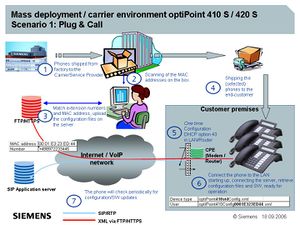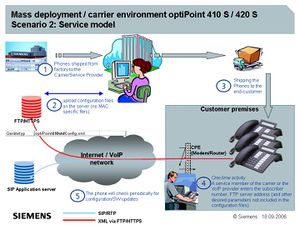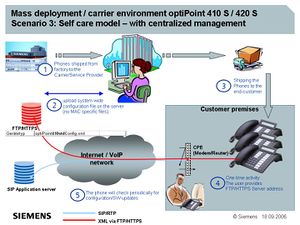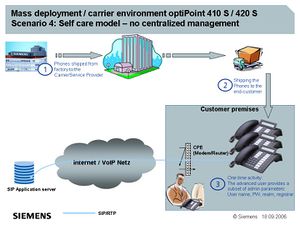Difference between revisions of "XML deployment scenario overview"
The Wiki of Unify contains information on clients and devices, communications systems and unified communications. - Unify GmbH & Co. KG is a Trademark Licensee of Siemens AG.
m |
|||
| (6 intermediate revisions by 2 users not shown) | |||
| Line 1: | Line 1: | ||
| − | + | These are XML deployment scenarios for [[optiPoint 410/420 S]] phones, etc. | |
| − | |||
| − | |||
| − | |||
| − | |||
| − | |||
| − | |||
| − | === Prerequisites | + | == Scenario 1: Plug & Call == |
| − | * One-time pre-configuration of the LAN (DHCP option 43, e.g. on network server or CPE) – a potential limitation in SOHO environment | + | |
| − | * Generating the configuration files (before) installing the phones – may require minor integration work in the system management / CMR system | + | === Benefits === |
| − | * Logistics: Scanning of MAC addressing from the phone box / deploying of phones assigned to a particular user | + | * No action required on user side (Plug & Call). |
| + | * Phones automatically retrieve configuration data when connecting to the LAN. | ||
| + | * Allows complete (i.e. phone / user individual) deployment – and individual service/updates through the lifecycle. | ||
| + | * [[FTP]] or [[HTTPS]] protocol works in [[NAT]] environment. | ||
| + | * Automatic software maintenance through the lifecycle. | ||
| + | |||
| + | === Prerequisites === | ||
| + | |||
| + | * One-time pre-configuration of the [[LAN]] ([[DHCP]] option 43, e.g. on network server or CPE) – a potential limitation in [[SOHO]] environment. | ||
| + | * Generating the configuration files (before) installing the phones – may require minor integration work in the system management / [[CMR]] system. | ||
| + | * Logistics: Scanning of [[MAC]] addressing from the phone box / deploying of phones assigned to a particular user. | ||
| + | |||
| + | === Scenario overview === | ||
[[Image:OptiPoint_410420_S_V4_1_XML_Deployment_Image2.jpg|none|thumb|This is the plug&call scenario using XML files]] | [[Image:OptiPoint_410420_S_V4_1_XML_Deployment_Image2.jpg|none|thumb|This is the plug&call scenario using XML files]] | ||
| − | + | ||
| − | ==Scenario 2 Service model== | + | == Scenario 2: Service model == |
| − | ===Benefits=== | + | |
| − | === Prerequisites | + | === Benefits === |
| − | ==Scenario 3 Self care model – with centralized management== | + | |
| − | ===Benefits=== | + | * Only minor efforts for providing centralized configuration data (e.g. no [[MAC]] address related logistics – system wide data only). |
| − | === Prerequisites | + | * Minor security requirements on processing the configuration files. |
| − | ==Scenario Self care model – no centralized management== | + | * [[FTP]] or [[HTTPS]] protocol works in [[NAT]] environment. |
| − | ===Benefits=== | + | * Best if combined with other service offerings, e.g. network analysis / network setup - which require initial expert visit on user site. |
| − | === Prerequisites | + | |
| + | === Prerequisites === | ||
| + | * Initial on-site visit of a service / level 1 technician. | ||
| + | * [[DHCP]] option 43 helpful, but not necessarily required. | ||
| + | |||
| + | === Scenario overview === | ||
| + | |||
| + | [[Image:OptiPoint_410420_S_V4_1_XML_Deployment_Image4.jpg|none|thumb|This is the service scenario using XML files]] | ||
| + | |||
| + | == Scenario 3: Self care model – with centralized management == | ||
| + | |||
| + | === Benefits === | ||
| + | |||
| + | === Prerequisites === | ||
| + | |||
| + | === Scenario overview === | ||
| + | |||
| + | [[Image:OptiPoint_410420_S_V4_1_XML_Deployment_Image6.jpg|none|thumb|This is the Self care model – with centralized management - scenario using XML files]] | ||
| + | |||
| + | == Scenario 4: Self care model – no centralized management == | ||
| + | |||
| + | * Strictly speaking, this is no mass deployment scenario - but is nevertheless described to ????? | ||
| + | |||
| + | === Benefits === | ||
| + | |||
| + | === Prerequisites === | ||
| + | |||
| + | === Scenario overview === | ||
| + | |||
| + | [[Image:OptiPoint_410420_S_V4_1_XML_Deployment_Image8.jpg|none|thumb|This is the Self care model – no centralized management - scenario]] | ||
Latest revision as of 08:24, 25 May 2007
These are XML deployment scenarios for optiPoint 410/420 S phones, etc.
Contents
Scenario 1: Plug & Call
Benefits
- No action required on user side (Plug & Call).
- Phones automatically retrieve configuration data when connecting to the LAN.
- Allows complete (i.e. phone / user individual) deployment – and individual service/updates through the lifecycle.
- FTP or HTTPS protocol works in NAT environment.
- Automatic software maintenance through the lifecycle.
Prerequisites
- One-time pre-configuration of the LAN (DHCP option 43, e.g. on network server or CPE) – a potential limitation in SOHO environment.
- Generating the configuration files (before) installing the phones – may require minor integration work in the system management / CMR system.
- Logistics: Scanning of MAC addressing from the phone box / deploying of phones assigned to a particular user.
Scenario overview
Scenario 2: Service model
Benefits
- Only minor efforts for providing centralized configuration data (e.g. no MAC address related logistics – system wide data only).
- Minor security requirements on processing the configuration files.
- FTP or HTTPS protocol works in NAT environment.
- Best if combined with other service offerings, e.g. network analysis / network setup - which require initial expert visit on user site.
Prerequisites
- Initial on-site visit of a service / level 1 technician.
- DHCP option 43 helpful, but not necessarily required.
Scenario overview
Scenario 3: Self care model – with centralized management
Benefits
Prerequisites
Scenario overview
Scenario 4: Self care model – no centralized management
- Strictly speaking, this is no mass deployment scenario - but is nevertheless described to ?????








